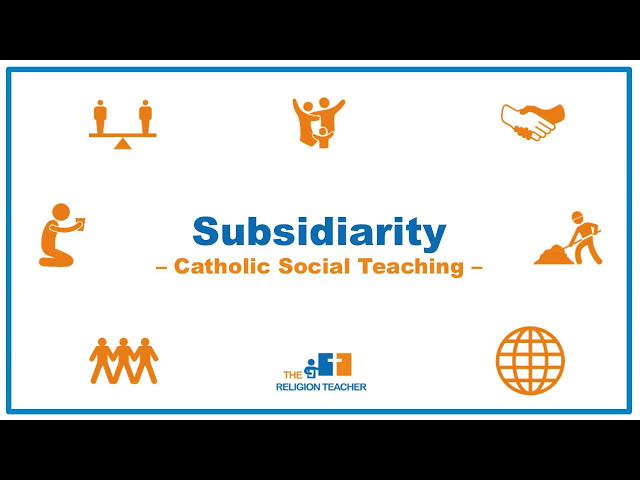
Subsidiarity | Catholic Social Teaching
What if the highest or at least the higher power in a society like the federal government, gets too involved? This threat is the basis for a key element of Catholic Social Teaching called subsidiarity.
Catholic social teaching holds subsidiarity as a standard by which powers should be involved in the societies they govern.
Put simply, subsidiarity means nothing should be done at a higher level that can be done well or better at a lower level.
According to the Catechism of the Catholic Church, the principle of subsidiarity states that "a community of a higher order should not interfere in the internal life and community of a lower order.” They should act always with the view to the common good of society, which means not depriving local authorities of their power.
The higher order should only be involved in those tasks that cannot be carried out at the local level.
Individual participation is required. Subsidiarity gives responsibility over to the individuals and local communities to work towards the common good. The common good is not only the responsibility of the state. It must be pursued by all people at all levels of society.
By lower order, we mean "intermediate communities" such as the family, groups, associations, local governments, etc.
For example, the family is an "intermediate community" in which the principle of subsidiarity applies because it is a real community in which higher authorities should not interfere or interrupt.
Also, local governments of cities and towns should operate under the principle of subsidiarity.
Even clubs or associations act independently and work towards the common good without the influence of governments of the states. To do otherwise would be an infringement upon their rights and the right of individuals to organize together.
This principle has its foundations in the way that God himself exercises power. God has a great regard for human freedom. Think of the story of Creation. God did not force Adam and Eve to avoid the Tree of Knowledge. He gave them the freedom to do as they wish. Likewise, Jesus, the King of Kings, did not force anyone to follow him or believe in him. This respect for freedom was held in such high esteem that he was sentenced to death and killed by local jurisdiction.
Likewise, those who govern human communities should respect individual freedom and the freedom of intermediate communities in the same way.
This is the principle of subsidiary.
This video is a part of The Religion Teacher's Catholic Social Teaching Activity Pack: http://www.thereligionteacher.com/catholic-social-teaching-activity-pack/
SUBSCRIBE for more Catholic videos: http://www.youtube.com/subscription_center?add_user=thereligionteacher
CONNECT WITH THE RELIGION TEACHER:
-- Facebook: https://www.facebook.com/TheReligionTeacher
-- Pinterest:https://www.pinterest.com/religionteacher/
CONNECT WITH JARED:
-- Instagram: https://www.instagram.com/jareddees/
-- Twitter: https://twitter.com/jareddees
-- LinkedIn: https://www.linkedin.com/in/jareddees/
ARE YOU A RELIGIOUS EDUCATOR? CHECK OUT THESE RESOURCES:
-- Activities: https://www.thereligionteacher.com/religious-education-activities/
-- Popular Lesson Plans: https://www.thereligionteacher.com/catholic-lesson-plans/
-- The Religion Teacher's Guide to Lesson Planning: https://www.thereligionteacher.com/guide-to-lesson-planning/
-- BECOME A MEMBER: Access hundreds of printable worksheets, class videos, and online courses here: https://members.thereligionteacher.com/join/
Catholic social teaching holds subsidiarity as a standard by which powers should be involved in the societies they govern.
Put simply, subsidiarity means nothing should be done at a higher level that can be done well or better at a lower level.
According to the Catechism of the Catholic Church, the principle of subsidiarity states that "a community of a higher order should not interfere in the internal life and community of a lower order.” They should act always with the view to the common good of society, which means not depriving local authorities of their power.
The higher order should only be involved in those tasks that cannot be carried out at the local level.
Individual participation is required. Subsidiarity gives responsibility over to the individuals and local communities to work towards the common good. The common good is not only the responsibility of the state. It must be pursued by all people at all levels of society.
By lower order, we mean "intermediate communities" such as the family, groups, associations, local governments, etc.
For example, the family is an "intermediate community" in which the principle of subsidiarity applies because it is a real community in which higher authorities should not interfere or interrupt.
Also, local governments of cities and towns should operate under the principle of subsidiarity.
Even clubs or associations act independently and work towards the common good without the influence of governments of the states. To do otherwise would be an infringement upon their rights and the right of individuals to organize together.
This principle has its foundations in the way that God himself exercises power. God has a great regard for human freedom. Think of the story of Creation. God did not force Adam and Eve to avoid the Tree of Knowledge. He gave them the freedom to do as they wish. Likewise, Jesus, the King of Kings, did not force anyone to follow him or believe in him. This respect for freedom was held in such high esteem that he was sentenced to death and killed by local jurisdiction.
Likewise, those who govern human communities should respect individual freedom and the freedom of intermediate communities in the same way.
This is the principle of subsidiary.
This video is a part of The Religion Teacher's Catholic Social Teaching Activity Pack: http://www.thereligionteacher.com/catholic-social-teaching-activity-pack/
SUBSCRIBE for more Catholic videos: http://www.youtube.com/subscription_center?add_user=thereligionteacher
CONNECT WITH THE RELIGION TEACHER:
-- Facebook: https://www.facebook.com/TheReligionTeacher
-- Pinterest:https://www.pinterest.com/religionteacher/
CONNECT WITH JARED:
-- Instagram: https://www.instagram.com/jareddees/
-- Twitter: https://twitter.com/jareddees
-- LinkedIn: https://www.linkedin.com/in/jareddees/
ARE YOU A RELIGIOUS EDUCATOR? CHECK OUT THESE RESOURCES:
-- Activities: https://www.thereligionteacher.com/religious-education-activities/
-- Popular Lesson Plans: https://www.thereligionteacher.com/catholic-lesson-plans/
-- The Religion Teacher's Guide to Lesson Planning: https://www.thereligionteacher.com/guide-to-lesson-planning/
-- BECOME A MEMBER: Access hundreds of printable worksheets, class videos, and online courses here: https://members.thereligionteacher.com/join/
Тэги:
#subsidiarity #catholic_social_teaching #social_justice #principle_of_subsidiarity #subsidiarity_catholicКомментарии:
Shapur - Batel
Moltafet
Ey Sanam Suhti Maro
Zafar Ayubi
Ali Baran - Gül Bahçesi / Elbet Birgün Sevdugum
Hasan Yalçın
Subsidiarity | Catholic Social Teaching
The Religion Teacher
The Ballad of Long Long Honeymoon — our new channel trailer!!!
Long Long Honeymoon
Devil in disguise
PostMaloneAddict
94.3 Q FM Lira City-9PM Prime News With Doreen Opio on 28th March 2024
Radio Q FM Lira City 94.3
Der dunkelste Tag meines Lebens
Tattooman Pattaya Tv


























